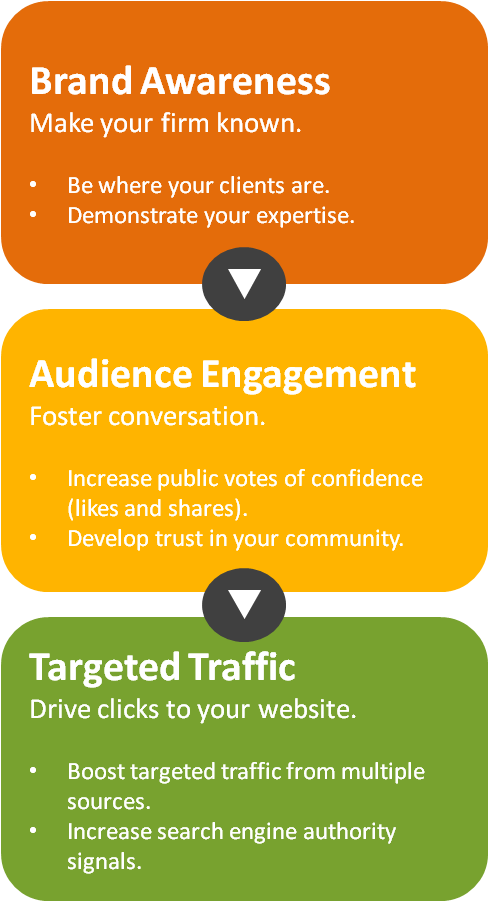A Training Article for FindLaw Clients by Michael Owen Hill, Team Lead – Social Media
Comments are a fundamental aspect of blogs. In essence, the ability of the reader to comment (and of the blogger to respond) is one of the primary factors that distinguish social content, like blogs, from more static content, like websites. Furthermore, readers who submit comments expect those comments to be published – and they expect the blogger to respond.
For this blogger training article, your Blog Services Team at FindLaw will be addressing the importance of moderating reader comments on your blog. If we’ve been clear, after you read this article you’ll come to believe as we do – that engaging with your readers is an investment in the success of your blog, and therefore an investment in your practice.
The Importance of Engagement
Engagement is at the heart of social media. The ability to engage with a community of readers – above and beyond those actively looking for an attorney – is at the heart of what makes blogs so powerful. In addition to topical and timely information, Web searchers are often seeking an opportunity to engage. This is one of the reasons it is so valuable for attorneys to have a voice in the “blogosphere.”
The downside is that getting the most out of your blog can require some engagement on your part. Specifically, it may take a small investment of your time to moderate the comments your blog generates. But the payoffs in authority, reader engagement and blog performance are well worth the time and effort.
Establishing Authority, Building Brand Loyalty
When a new reader visits your blog and notices that others have taken the time to comment on posts – and that you have responded to these comments – it sends a powerful message that you are actively engaged with your readers. It also helps to demonstrate your passion for what you do and your authority on the subjects your blog covers.
Likewise, Google and other search engines understand that posts with comments are more valuable and authoritative – and are more likely to be the kind of information a Web searcher is looking for. The precise way in which comments are indexed and valued is clear only to the search engines, but with the ever-increasing focus on social, timely content, you can be sure the search engines are paying attention.
Gone are the days when all that was necessary to demonstrate authority was to simply broadcast your message at top volume to the largest possible audience. Today’s searchers expect engagement and are prepared to reward those who engage with brand loyalty. For law firms, brand loyalty translates into word-of-mouth referrals, a vital source of business for many FindLaw clients.
What About Undesirable Comments?
We’ve all seen them. Nonsensical, poorly-spelled rants. Off-topic and off-color commentary. Overly-critical and purely negative feedback. It may be tempting for a blogger to dismiss – and quickly delete – these types of comments, or indeed any comment that doesn’t add to the discussion in a positive way.
That would be a mistake.
The fact is, from a purely functional perspective, even the “bad” comments can be valuable. This is as true for your blog as it is for a website that sells garden tools. Research by Amazon.com has shown that products listed with a consumer review – even a negative review – sell better.
The best default practice for any blogger is to publish comments, even if they are unflattering or not particularly germane to the topic of the post. Often it is those less-than-ideal comments which prompt the next reader to respond, to “set the record straight,” as it were. Suddenly, rather than a broadcast-only blog, you have a lively exchange that draws in even more readers.
In the end, only those posts that are offensive, are obvious spam, or that might create a conflict of interest should be excluded from publication on your blog. Certainly exercise your discretion. You should never publish a comment you feel might be harmful to your reputation or to others. We are simply encouraging you to adopt this position: “If I can live with it, I’ll publish it.”
Our Recommendations for Moderating Comments
Here are four rules – the “Four Rs” – to guide you in moderating comments on your FindLaw blog:
- React: One of the biggest challenges our clients face is reacting to new comments in a timely manner. It’s easy to put it on the back burner. While moderating comments on your blog is not your highest priority, experience shows that if you set a time each week to review all comments and publish those that pass muster, you will be better off. Given the temporal nature of your blog’s content, publishing comments on weeks-old posts is not likely to enhance performance or authority.
- Redact: Feel free to withhold any names or other personal details contained in a comment. Just be sure you make it clear to readers that you have altered the comment and explain your reasoning. A simple note such as “individual names withheld to protect privacy” is sufficient.
- Respond: To be effective, you should respond to your reader’s questions, concerns or comments. It’s not necessary to spend a great deal of time and effort here. A “thank you for commenting, we are always glad to hear from our readers” or similar response is generally adequate. If, however, the comment is insightful or thought-provoking, consider spending a bit more time on your response.
- Relate: Strive to use your blog as a forum to actually relate to your readers, person-to-person. If a reader submits a comment that discusses an upsetting event or a negative outcome, don’t feel like you need to provide an answer or a solution. Sometimes the most effective response is to simply say “I’m sorry that happened to you” or “that must have been a very difficult time.” Respond on the human level – relate to your readers – and thus build a truly valuable social brand.
Managing your social brand need not be a painful experience. You have the distinct advantage of an entire team of dedicated professionals here at FindLaw who can offer you specific guidance regarding your reader’s comments. We encourage you to reach out to your Account Manager if you have questions.
Can’t FindLaw Moderate Comments for Me?
It would be nice, wouldn’t it? If only someone could truly engage with your readers on your behalf. Unfortunately, we know that it is almost impossible for anyone who is not you to respond at the appropriate level and with the appropriate voice.
Although we have stated that, in some cases, a more “off the cuff” or generic response is adequate, it’s practically inevitable that a reader will leave a comment to which only you can respond effectively. Nothing kills engagement like responses that seem impersonal, automatic or robotic. Rather than acting as a surrogate for our clients in these conversations, our goal at FindLaw is to facilitate engagement by providing the guidance our clients seek when stepping into the social media space.
What if my Blog Doesn’t get a lot of Comments?
Hopefully we’ve sold you on the importance of comments and of properly responding to them. But what if your blog isn’t generating a high level of commentary? Does that mean that your blog isn’t working?
Not at all.
For every thousand visitors, you’ll get roughly one comment. That is the conventional wisdom. Your blog may already be performing well for key search metrics – number of unique visitors and search engine visibility – but it may still take some time to build the level of social authority that generates comments.
It’s helpful to think of your blog as the kind of social event where the attendees are all interested in the same sorts of topics but nobody knows anyone else very well. In other words, you need an “ice breaker” to get the conversation going. So we encourage you to consider every reader comment on your blog as a potential conversation-starter that could form the basis of an ongoing discourse between you and an ever-growing community of loyal readers, word-of-mouth referrers, and potential clients.
The Perils of Self-Commentary
This topic was raised by a FindLaw client who wondered, given the importance of comments, whether it’s a good idea to comment on their own blog. First, responding to comments with a comment of your own is ideal. This is exactly what we would hope all of you are doing. But being the first to comment on your own blog posts – whether FindLaw-provided or written by you – is problematic.
There are inexperienced or unscrupulous bloggers who routinely (and sometimes deceptively) self-comment in an attempt to artificially boost the perceived value and relevance of their posts. Sometimes referred to as “astroturfing,” this is universally considered to be a bad practice. There’s nothing particularly wrong with the occasional self-comment; however, when it becomes a standard practice – especially if such self-comments are the only comments -such a thing begins to look odd to your blog’s readers.
Our self-commentary guidance is twofold:
- From time to time it’s okay, particularly if it’s just a matter of adding a detail or a personal note not contained in the post, but frequently or routinely commenting on your own posts is unwise.
- If you want to provide lengthy discussion or in-depth analysis, a follow-up blog post is a better choice.
Think of it this way: It’s hard to strike up a conversation with someone who is busy talking to himself or herself, but you probably don’t think it odd for a person to occasionally think out loud or return to a topic to clarify what was said. Again, we encourage you to place the situation in a social context, and let your natural social skills be your guide.
Concluding Thoughts
The purpose of this article is to provide an introduction and an overview, as well as encourage you to consider the value of engagement through blog comments and responses. You probably have some questions you’d like answered. If you have a question or concern specific to your blog, please contact your Account Manager for immediate assistance. If you have more general questions or ideas for future training topics, feel free to submit these using the form on this page.
Thank you again for choosing FindLaw for your website, blog and social media solutions.





